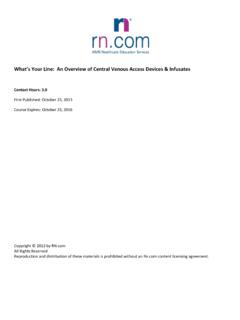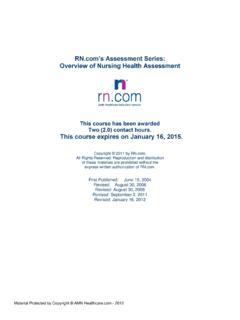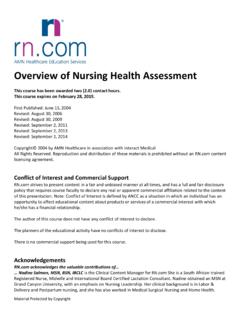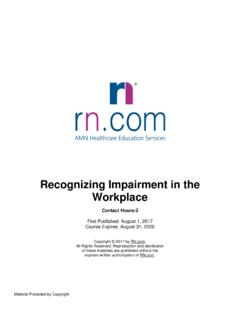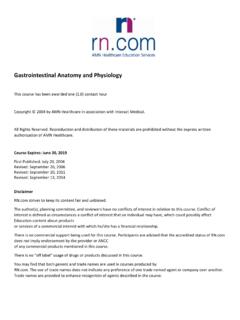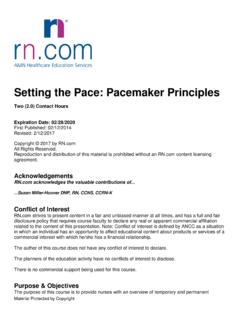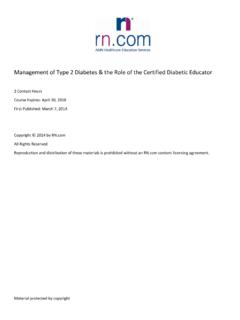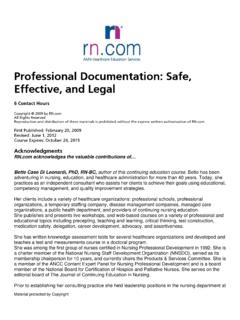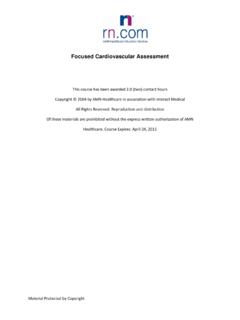Transcription of Medication Administration for CNAs
1 Material Protected by Copyright Medication Administration for CNAs Two ( ) contact hours Expiration Date: 12/4/2017 First Published: 12/4/2013 Reproduction and distribution of these materials is prohibited without content licensing agreement. Copyright 2013 by All Rights Reserved. Acknowledgements wishes to acknowledge the valuable contributions ..Nadine Salmon, MSN, BSN, IBCLC is the Clinical Content Manager for She is a South African trained Registered Nurse, Midwife and International Board Certified Lactation Consultant. Nadine obtained an MSN at Grand Canyon University, with an emphasis on Nursing Leadership.
2 Her clinical background is in Labor & Delivery and Postpartum nursing, and she has also worked in Medical Surgical Nursing and Home Health. Nadine has work experience in three countries, including the United States, the United Kingdom and South Africa. She worked for the international nurse division of American Mobile Healthcare, prior to joining the Education Team at Nadine is a nurse planner for and is responsible for all clinical aspects of course development. She updates course content to current standards, and develops new course materials for Conflict of Interest strives to present content in a fair and unbiased manner at all times, and has a full and fair disclosure policy that requires course faculty to declare any real or apparent commercial affiliation related to the content of this presentation.
3 Note: Conflict of Interest is defined by ANCC as a situation in which an individual has an opportunity to affect educational content about products or services of a commercial interest with which he/she has a financial relationship. The author of this course does not have any conflict of interest to declare. The planners of the educational activity have no conflicts of interest to disclose. There is no commercial support being used for this course. Material Protected by Copyright Purpose & Objectives The purpose of this course is to enable the Certified Nursing Assistant (CNA) to safely assist patients in administering medications.
4 Principles of Medication safety will be reviewed. After successful completion of this course, you will be able to: 1. Discuss the principles of safe Medication Administration (including the 6 Rights of Medication Administration ). 2. Describe the Medication Administration procedure and importance of documentation. 3. Review Medication considerations in the elderly, allergies and drug interactions. 4. Discuss Medication safety and the National Patient Safety Goals (NPSGs) relating to Medication safety. 5. Define Medication errors, High-Alert Drugs, Look Alike / Sound Alike drugs and adverse drug events.
5 Glossary Adverse Drug Event Any event in which the use of a Medication , a device, or a special nutritional product (for example, infant formula) may have caused harm to a patient. Adverse Event An injury caused by medical personnel. Allergies A bad immune response by the body to a substance to which it is hypersensitive. High-Alert Drugs High-alert medications are drugs that have a high risk of causing patient harm if used in error. Look Alike/Sound Alike Drugs Some medications can look or sound like other drug names, which may lead to potentially harmful Medication errors.
6 Medical Error The failure of a planned action to be completed as intended. National Patient Safety Goals (NPSGs) Are goals for the safe Administration of Medication , to decrease Medication errors. These goals were developed by The Joint Commission (TJC) to help accredited organizations address specific areas of concern in regards to patient safety. Near Miss An incident or error that hospital personnel caused, but did not result in an injury to the patient this time. Sentinel Event An unexpected event that caused death or serious injury to a patient.
7 Material Protected by Copyright Introduction The CNA s essential responsibilities can be divided into 3 C s, namely the provision of Care, Comfort, and Communication. The CNA is an important part of the healthcare team, and provides a valuable service by performing routine patient care, providing for the comfort of the patient and communicating with the RN according to set policies and procedures. Ensuring the comfort of the patient is a large part of the CNA s scope of practice. Assisting patients with their Administration of medications helps to improve the comfort and general well-being of the patient.
8 The responsibilities of a CNA vary greatly from state to state. Always be familiar with the scope of practice in your own state. Registered nurses may delegate Medication Administration tasks to CNA s in certain states, if the CNA s training and competence to perform the task have been well established. It is your responsibility to inform the supervising RN of your particular skills and training, so that you can perform tasks that are within your legally protected scopes of practice. A CNA who possesses the proper education, training and experience may in fact administer certain medications to patients, under the supervision of the delegating nurse.
9 Communicating patient needs and procedures completed is also a critical part of the CNA s job responsibility. Timely and accurate reporting is a key element in avoiding errors in patient treatment. The CNA must be skillful in accurate and thorough observation, documentation and reporting. More Info The CNA s scope of practice refers to the tasks within his or her certified skill set. It is important to know one s scope of practice as defined by your state and your facility. Scope of Practice The Administration of specific medications can be delegated to a CNA if the CNA has received training in Medication Administration , is competent to administer certain medications and has adequate supervision by an RN.
10 Drugs that may be appropriate for a CNA to administer may include: 1. Oral, topical, suppository, eye drops, ear drops 2. Single dose immunizations administered intramuscularly in the deltoid muscle; and 3. Intradermal injections for allergy testing (Department of Veterans Affairs [DVA], 2013). Drugs that are not appropriate for Administration by a CNA include: 1. Any controlled substance 2. Experimental drugs 3. Medications requiring dosage adjustments or calculation of dosages 4. Medications requiring specialized training 5. Intravenous (IV) Administration , IV Drips (infusions) or IV Push drugs, unless the CNA is certified in IV therapy Material Protected by Copyright 6.
